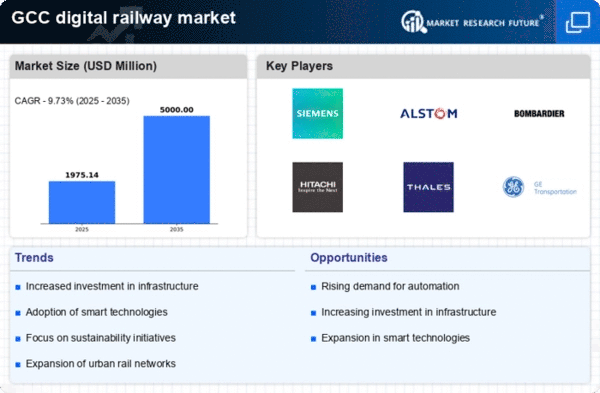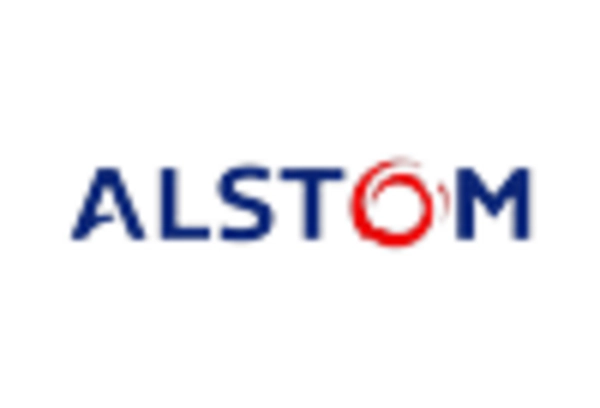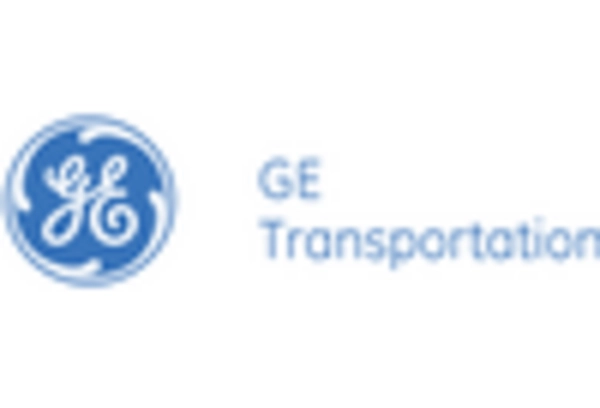Focus on Environmental Sustainability
The digital railway market is witnessing a growing emphasis on environmental sustainability, as governments and organizations strive to reduce carbon footprints and promote eco-friendly transportation solutions. The GCC region is increasingly adopting electric and hybrid trains, which are more energy-efficient and produce lower emissions compared to traditional diesel locomotives. This shift is likely to be supported by regulatory frameworks aimed at promoting sustainable practices within the transportation sector. As a result, the digital railway market is expected to expand, driven by the demand for greener alternatives and the integration of renewable energy sources into rail operations. This focus on sustainability not only aligns with global environmental goals but also enhances the appeal of rail transport as a viable alternative to road travel.
Government Investments in Infrastructure
The digital railway market is experiencing a surge in government investments aimed at modernizing and expanding railway infrastructure across the GCC. With a projected investment of over $20 billion in railway projects by 2030, governments are prioritizing the integration of digital technologies to enhance operational efficiency and passenger experience. This influx of funding is likely to facilitate the adoption of advanced signaling systems, real-time data analytics, and automated train operations. As a result, the digital railway market is poised for substantial growth, driven by the need for improved connectivity and reduced travel times. Furthermore, these investments are expected to create numerous job opportunities, thereby stimulating the regional economy and fostering innovation within the digital railway market.
Rising Urbanization and Population Growth
Urbanization in the GCC is accelerating, with cities like Dubai and Riyadh witnessing rapid population growth. This demographic shift is creating an increased demand for efficient public transportation systems, including railways. The digital railway market is likely to benefit from this trend, as urban planners and governments seek to implement smart transportation solutions that can accommodate the needs of growing populations. By 2030, it is estimated that urban areas in the GCC will house over 80% of the population, necessitating the expansion of railway networks. The integration of digital technologies in rail systems can enhance capacity, reduce congestion, and improve overall service quality, making it a critical driver for the digital railway market.
Technological Advancements in Rail Systems
The digital railway market is significantly influenced by rapid technological advancements that are transforming rail operations. Innovations such as Internet of Things (IoT) devices, artificial intelligence (AI), and big data analytics are being increasingly integrated into railway systems. These technologies enable real-time monitoring, predictive maintenance, and enhanced operational efficiency. For instance, the implementation of AI-driven analytics can reduce operational costs by up to 15%, while improving service reliability. As these technologies continue to evolve, they are expected to play a pivotal role in shaping the future of the digital railway market, driving investments and encouraging the adoption of smart rail solutions across the GCC.
Increased Demand for Enhanced Passenger Experience
The digital railway market is being propelled by a growing demand for enhanced passenger experiences. Travelers are increasingly seeking convenience, comfort, and connectivity during their journeys. In response, railway operators in the GCC are investing in digital solutions that improve customer service, such as mobile ticketing, real-time train tracking, and onboard Wi-Fi. These enhancements are likely to attract more passengers to rail services, thereby increasing ridership and revenue. Furthermore, the integration of user-friendly digital platforms can streamline operations and provide valuable insights into passenger preferences, ultimately driving innovation within the digital railway market. As customer expectations continue to evolve, the focus on improving passenger experience will remain a key driver for growth.
















